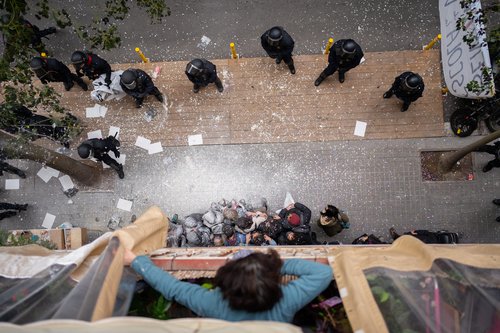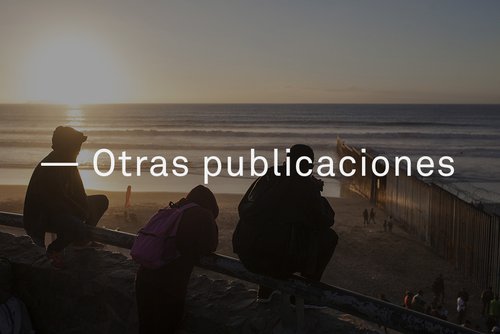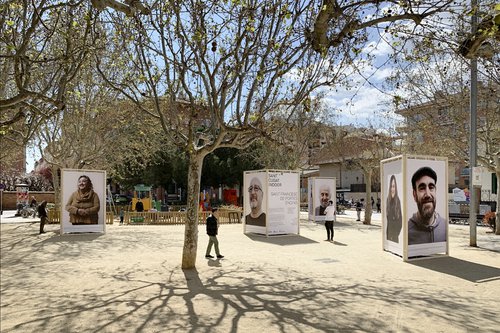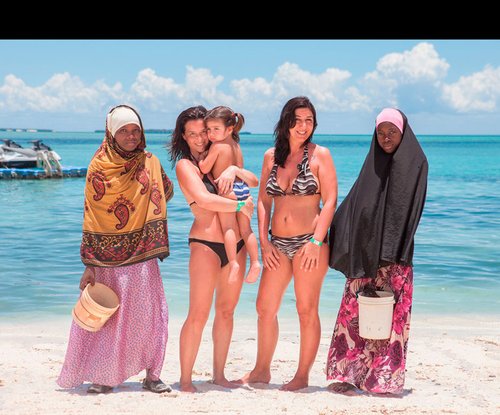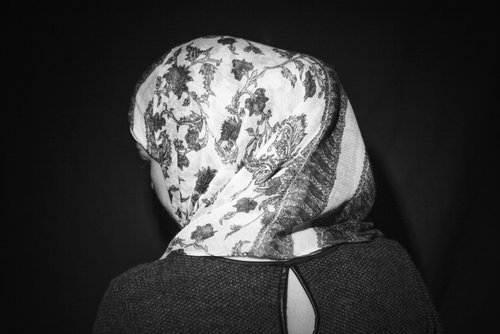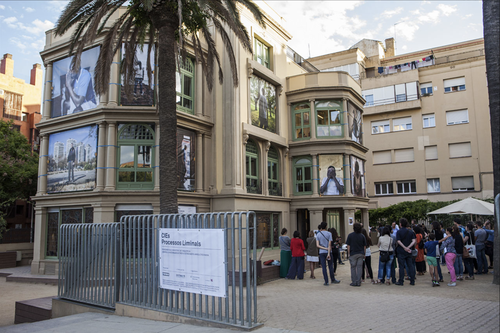The Faces of the CIE
Assaults, abuse, lack of medical care and even unexplained deaths have been reported within the immigration detention centers (CIE) of Spain. The project attempts to portray the conditions of these centers through interviews with some of the people who have been held against their will, simply because of their "undocumented" status.
by - Pau Coll
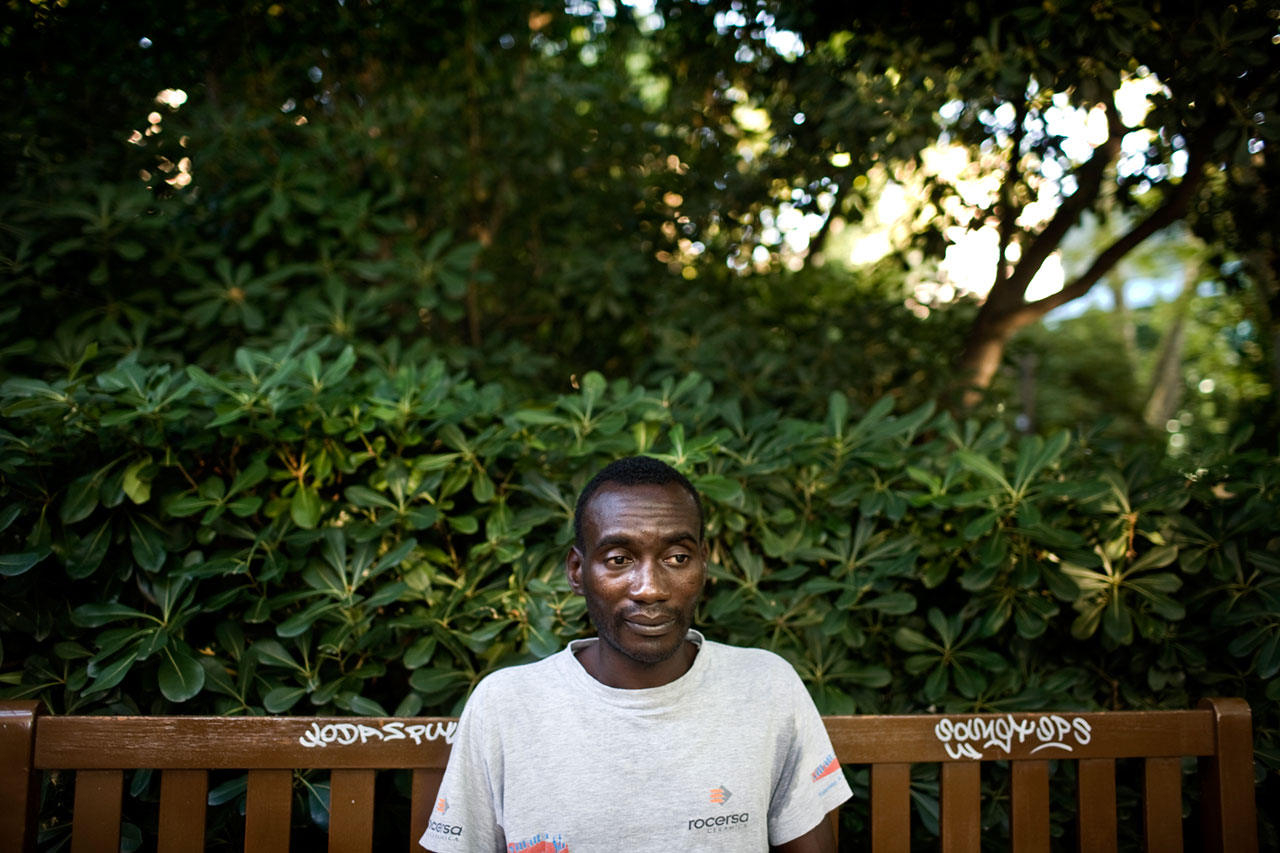
Mamadou Balde. Senegal. 30 days in the CIE.
"I told them I was not good, to send me to the doctor, that I could not eat, that I could not sleep, that I couldn't do anything. I've been asking for a long time to be taken to the hospital, but they don't want to send me to one." Mamadou is in a hospital today, specifically in the only medical center in Catalonia specializing in tuberculosis treatment. "I think the cause of the disease if the CIE, because I didn't cough before, but when I got there, it all started."
It has been ten years since Mamadou left agricultural work in his native Senegal, in search of his brother living in Spain. "The entrance was a bit difficult because we spent two days at sea. The place we were was all messed up, the police rescued us all. Otherwise, we'd still be there." Mamadou first stepped on Spanish soil in Fuerteventura and was subsequently transferred to Andalusia, where he was released. His experience in fields allowed him to work several agricultural jobs for years, but in 2012, he couldn't find any work in the south and decided to move to an apartment in Lleida, near his brother. "They came to the house where seven people lived and arrested everyone who didn't have papers." It was March 25, 2014.
Mamadou's symptoms began after ten days of confinement at the CIE in the Barcelona Free Zone. He was cold, he couldn't eat. He had a fever and lost all his strength. "I got this [tuberculosis] in there, I wasn't sick before. One day I coughed up blood. I went downstairs to look for a nurse, but it was Sunday, and no one was there." He could not be transferred to the Hospital Clinic until he had 30 days of confinement. He tested positive for one of the oldest diseases affecting humans: tuberculosis. At that time, he was granted freedom.
Mamadou has been treated for three months and, at best, still needs another three months of treatment. "I'm here now to be cured, that's the idea. In the center, there are people who have been here for a year or two. I don't know how long I'm going to spend here."
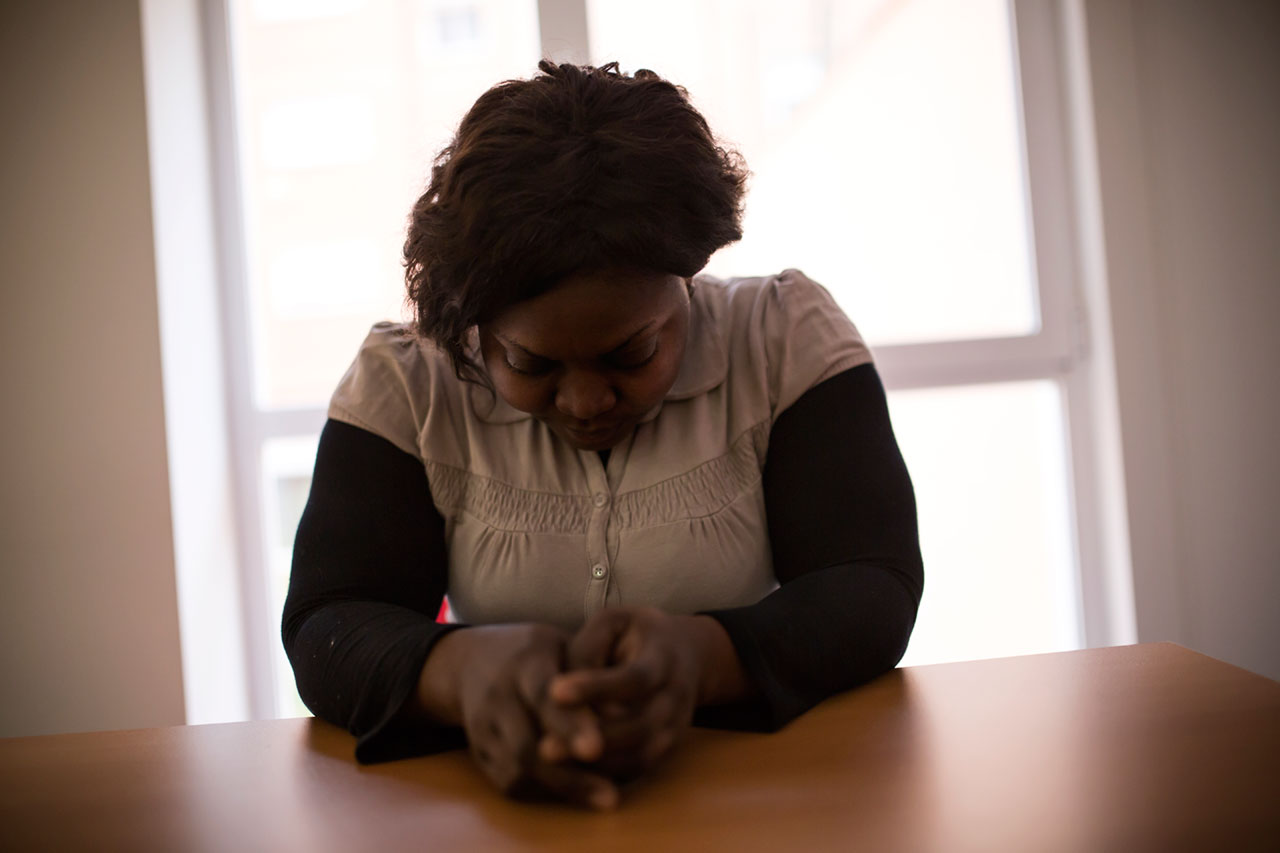
Marisol. Equatorial Guinea. 33 days in the CIE.
Marisol is not really named Marisol. She has chosen the name of one of her daughters for this account, which begins the day her husband died, back in her country.
"I came to seek a life for my children, I was widowed. I have four children, one of them is sick, does not speak, does not walk. He is an invalid...I wanted to bring my sick son so they could treat him here, because in my country, there are no good doctors."
In 2007, Marisol managed to raise enough money to buy a plane ticket and a three-month visa to Spain, where a sister of her mother lives. She traveled alone, leaving her children behind. For the next three years, she was able to avoid police checks until one day in June 2010, she was arrested. She was on her way to a training course for migrant women.
"It was ten in the morning when I got off the bus, on a street that's nearby. There, the cops caught me, asked me about my documents and I told them I don't have anything...The next day I was taken to Madrid. I didn't know what they were going to do to me there. After three days (in the women's ward of the CIE of Aluche) I was taken to the airport to get on the plane. I told them I wasn't going to get on the plane, since I came here and I didn't do anything wrong. I've come to find a life for my children, I can't leave like this..."
Marisol suffered an anxiety attack. She collapsed at the plane's doorstep and in that state, it was impossible to deport her to Equatorial Guinea. The cops returned her to the CIE, pending a new flight.
"I was with a lot of woment from different countries. They told me they mistreated people at the airport, that I'm lucky I haven't been touched or anything. But I saw three women hurt. They told me they were beaten at the airport. There was even a Brazilian woman who was two months pregnant and had a miscarriage."
Although the memory of the occurances causes her to cry, she keeps talking. "My friend too. She had a 4-year-old boy here and was told that even if she have a Spanish child, you have to go back to your country anyway, it doesn't matter. She was hit at the airport too. The second time they took her, they tied her up with ropes and took her in the plane like that."
Marisol spent 30 more days in Aluche. 30 days waiting to be put back on the plane, but it never happened. "They didn't warn me. I was in the living room for breakfast, they told me take your things and go. They opened the door and told me to go."
Years later, Marisol has managed to organize her papers. "I just want to work and help my children so they can go to school, and my son who is sick has to come here. But to bring a family member, you need a work and housing contract. It's complicated..."
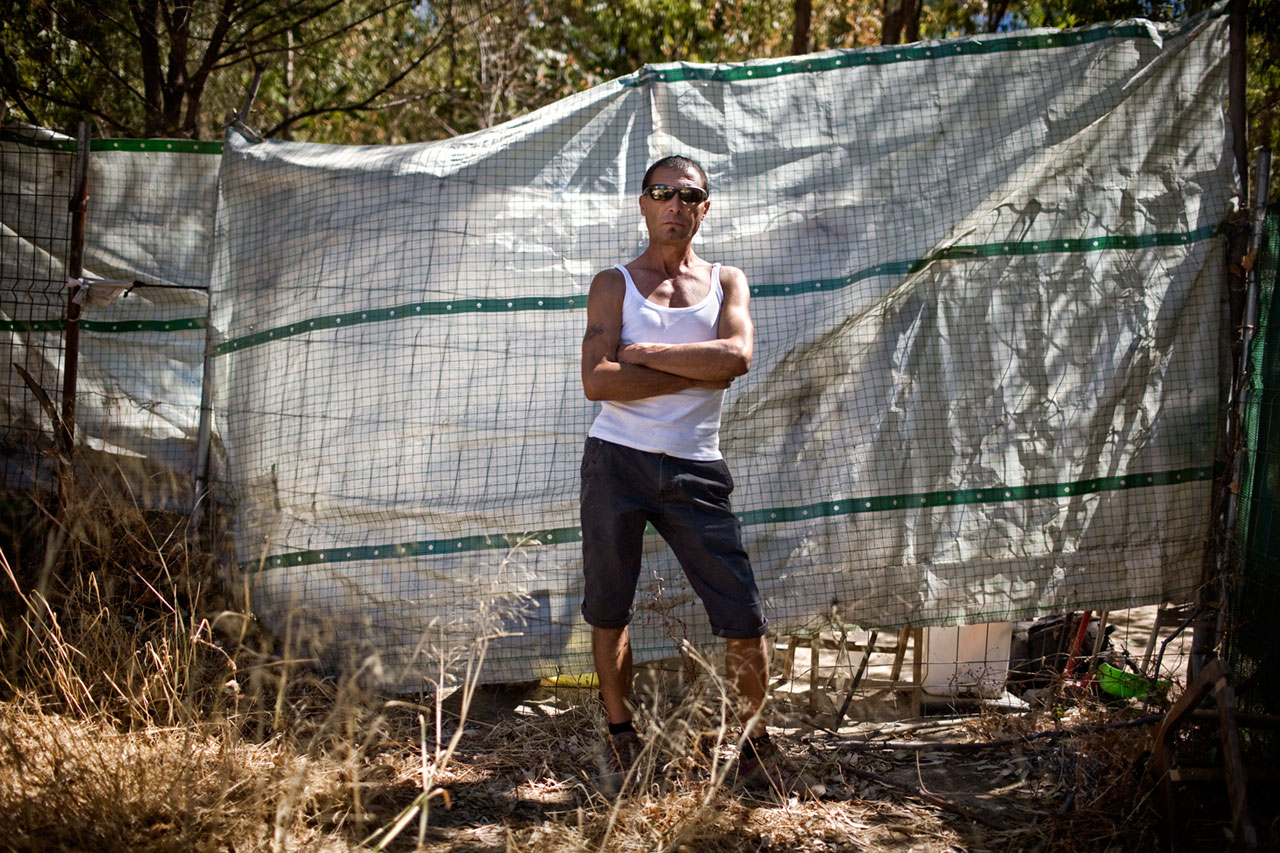
Ion Starescu. Romania. 56 days in the CIE.
Ion was a security guard in Romania, a trade that made him a tough man. He came here eight years ago. Working in construction in Madrid, he earned much more than a custodian in his hometown, but soon he was out of work and on the street. He thought of returning to his partner, a Peruvian immigrant with health problems that forced her to stay. He currently lives in a field in exchange for keeping an eye on it.
During the conversation, his girlfriend calls him several times. He is afraid that he will be too sincere. Ion's threatened. "The police chief came and said, 'You should think about talking to the newspaper or something because you can die at any time, and we know where you live. It's okay, no one has two lives for God's sake." Ion was arrested when he was returning from a food pantry. It was April 29, 2014 and he was locked up at the Internment Center for Foreigners in Madrid. "It's more like a Guatemalan prison, for God's sake, they bring a dog and a dog doesn't eat. I came in weighing 84 kilos and look at me now, 60 kilos in two months."
Ion was notified five times of an expulsion order. He says there were two times when he was supposed to be on a commercial flight to Romania. He was manhandled and escorted by four agents, but found a way to prevent his deportation. "I asked them to speak to the pilot of the plane. I have family here, I don't want to go to Romania, I told him. He said, 'It's okay, in five minutes you're free. I'm the pilot and the plane is mine.'" Repeatedly, the police beat Ion in the ribs, asking him to speak in Spanish, but the plane's pilot only spoke Romanian. The passengers were scared. He says in the back of the plane, they kept hitting him. Always on the body, never in the face.
Ion says that after the assaults, neither the center doctor nor the Red Cross wanted to take care of him medically. He also claims he was beaten inside the CIE. "The ones who get beaten the most are those from South America. They get beaten much more, I don't know why."
"I have my passport, I'm going alone to Romania, not with violence, not with blows, so I'm leaving when I want because I am European. Today I am here and tomorrow in France, or wherever I want."
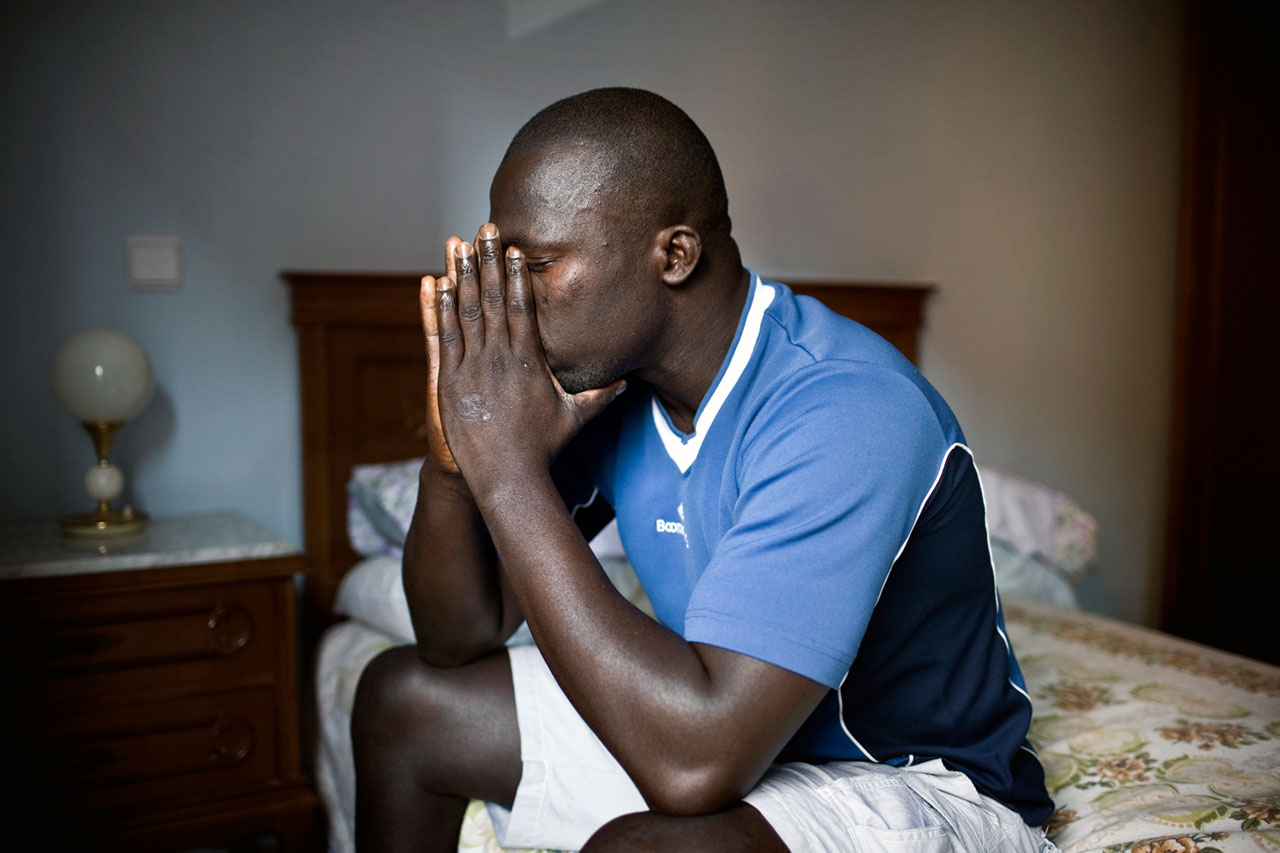
Hibra. Senegal. 39 days in the CIE.
Hibra is a fake name. This 34-year-old man always uses the name of his nephew when talking to strangers about his story. "I came here for a better future for my children. A future I never had. So I risked my life for them. I have come to Spain three times: in 2006, 2007 and 2008. The first two times I had no luck, but they sent me back to Senegal without any problem. In 2008 when I was caught, I was tried and charged for being a ship's captain, The Patera. I was sentenced to three years." Hibra was a fisherman in Dakar, and he had a large ship.
"Those three years I paid what I had to pay, there isn't any other solution, is there? And I pay it willingly, I haven't had any problems with anyone...Right now, my best freind is the prison chaplain, the best friend of all the immigrants here. I call him 'old Nacho.' What little I have earned in prison, he helps me send it to my family."
After serving his sentence, Hibra was released from prison. He lived and worked for three years in the town of Valeria la Buena, Valladolid, as a horse caretaker. "I liked it, but it's not my thing. But I try to do any job because what makes me happy is working and caring for my family." On January 17, 2014, Hibra was on his way to Valladolid to buy food when he was arrested for having no documentation and transferred to the Aluche Internment Center in Madrid. "The CIE is inhumane. I spent three years in jail and a month and a half in the CIE. If you want to take me to the CIE, I'd rather spend twice as much time in jail. It's the worst thing I've ever seen in my life."
"I thought it was serious because there was a plane on February 13 for Senegal. That's why they caught me." NGOs, friends and civil servants of Valeria wrote in his favor so he would not be deported. "That's why I'm talking to you. If it wasn't for the support of all the people, I wouldn't be here now. The mayor of Valeria, the people of Cubilla de Serrato, the old Nacho. People who help me are helping immigrants every day, you just don't see them." He was saved, but according to Hibra, on February 13, 34 people locked up in the CIE of Aluche were deported to Senegal. "You have to behave very well or super well so that you don't get hit...I had no problems. If you ask for rights but they don't give them to youif you do not ask for them. I kept my head down until now."
On the day Hibra was released, Valeria la Buena's neighbors hosted a party.
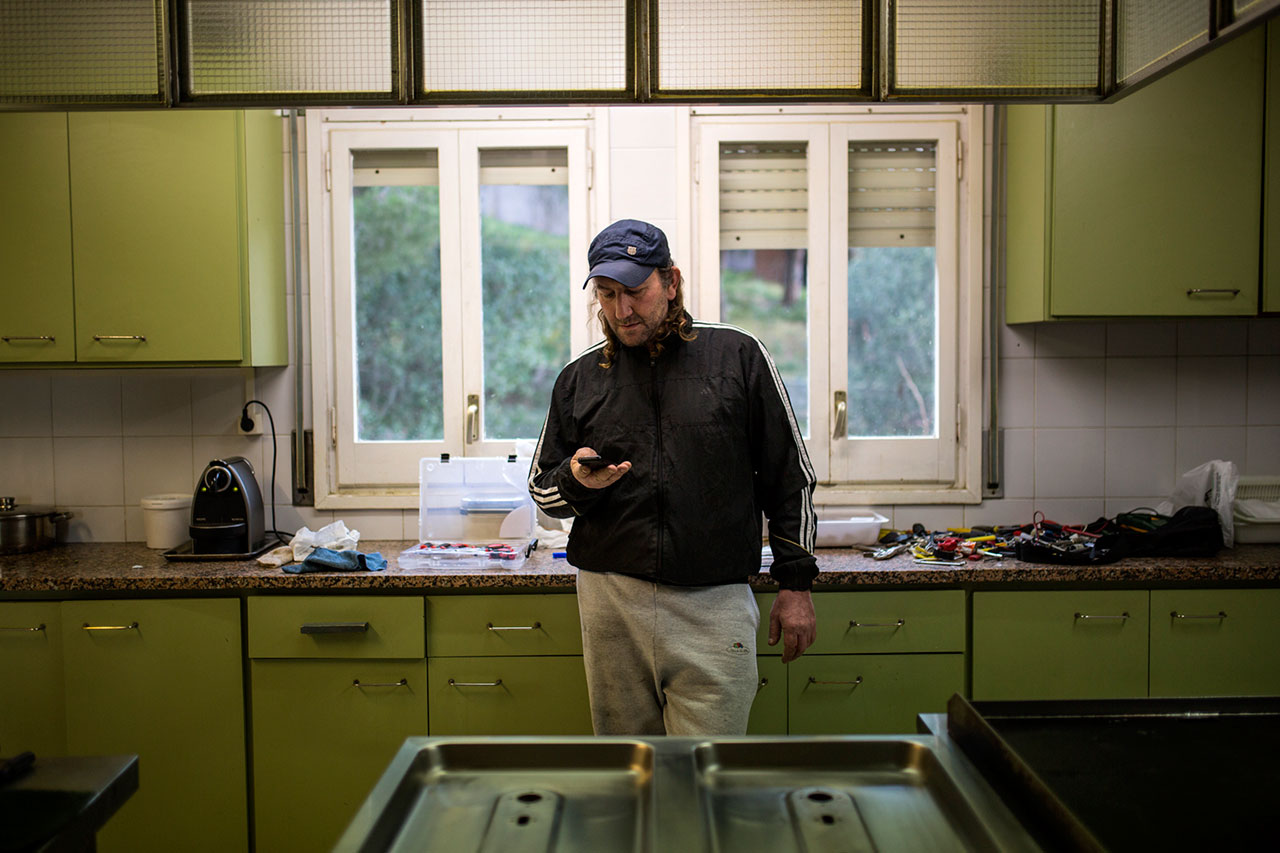
Salvador Adolfo Banko. Argentina. 60 days in the CIE.
The first Spanish land that Salvador stepped on as a free man was the deserted ditch of the C-31 road near the Prat del Llobregat. A police car opened the door and left Salvador full of bruises and almost unable to walk.
"In July 2011, I decided to come to Europe. I was bringing 400 grams of cocaine with me and that's what the Civil Guard found at the airport. I served three years and four months in [the prison of] Lladoners, Manresa."
On November 28, 2014, at 44, Salvador was released from prison. "The national police was waiting for me. From there, from the prison gate, they took me to court and well, the judge sent me to the CIE. I told the judge: 'Please don't lock me up again!' The judge replied: 'No, that's not a prison. It's a detention center.'"
"And when I saw the CIE...I'd rather do six months at the Model than five days in that Center. That's for little animals. The pride the cops have, they treat us...like shit! I've never felt as shitty as I did in the CIE."
"I wanted the 60 days to pass, and I thought I was going to leave earlier, but on the 60th, I think about 6 a.m., they came looking for me, unannounced. I thought I was going out on the street. No breakfast or anything. The expulsions came, they tied my hands, bare hands with ropes. They didn't even tell me I was going to fly anywhere, not anything. I found out I got expelled when I saw the plane."
"They took me in a van [toward the plane] and there I was, seriously frightened when a guy got on with a black bag...That's where they tied my feet and knees. It was four cops. 'How am I going to walk like this?' The policeman replied: 'If you don't get your bones right.' They dragged me up and there they beat me and we started to struggle.'' Salvador still keeps a photo on his phone of a bruise that takes up his entire thigh.
"Screaming, screaming and the pilot appeared: 'Leave him alone. This boy is not going to fly.' Then, they came down and gave me a couple punches in the face...I don't know...I guess it was a kind of joke."
At that very moment, Salvador was given freedom and was expelled from Europe for the next five years. The National Police left him at a street on the way to Barcelona. Salvador had to work hard to get his bags back that were already checked in and returned to Barcelona. "He left me on the road! I could not walk with my feet [tied up] and I had been beaten and my neck hurt after having been tied up so that I would not scream."
"They didn't warn me of anything, it was all at the last minute. And they were laughing at people. They tied me up like an animal, like a pig. From there came my joke too. If they had spoken to me, it would have been better for everyone. 14 hours on the plane tied like a worm, that's not right..."
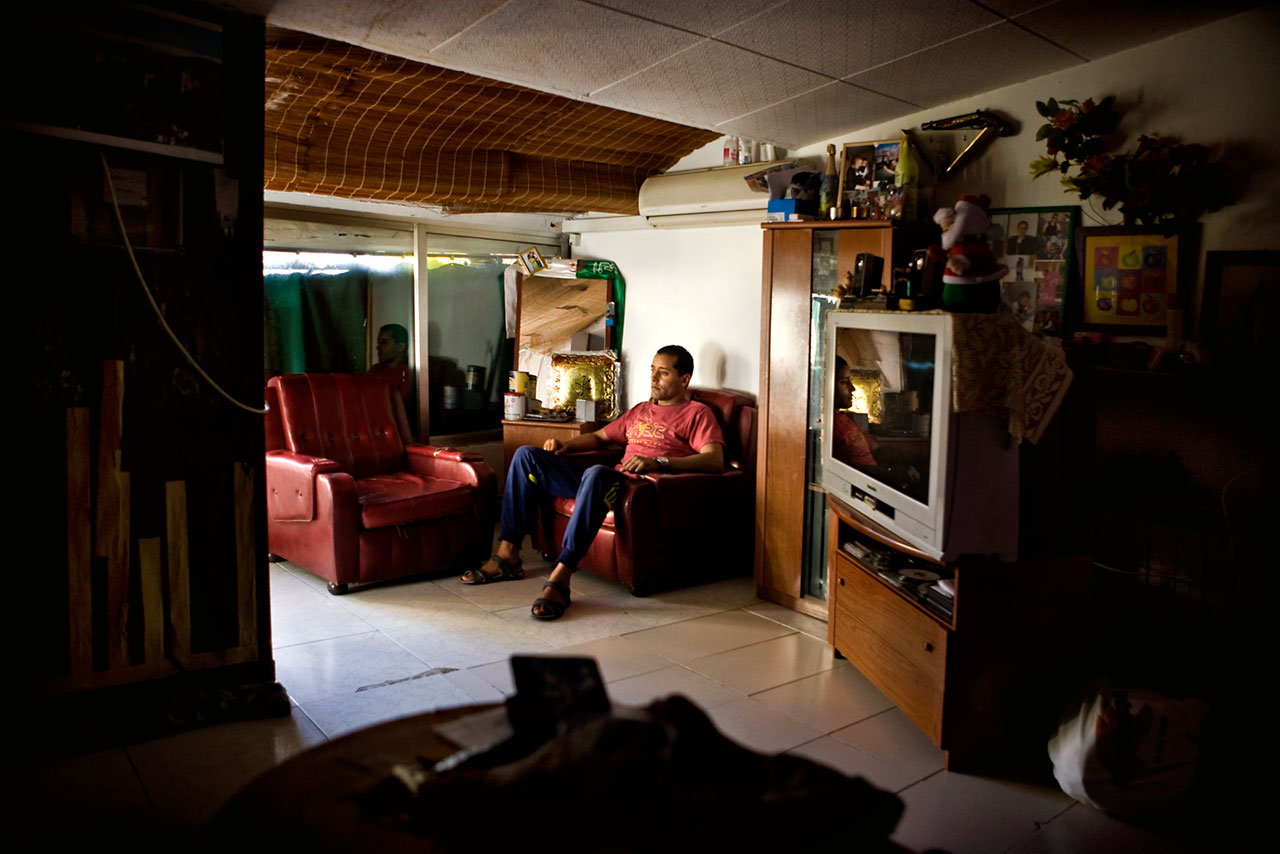
Zauhi Mohamed. Algeria. 135 days in the CIE.
Zauhi has been deported three times and three times, he's come back. His family is in Spain. His pregnant wife and a five-year-old son are also in a rough situation. They live in the same city, but Zauhi prefers not to share a home with them out of fear of being expelled because of them. With no money for work, this 27-year-old Algerian man lives on the floor of a tiny room borrowed by a countryman of his own. He speaks like a sunken man, each of his words conveys sadness.
Zauhi's story begins in 2007 on a beach in a city in Oran called Aaiún. On that beach, people can buy the right to risk their lives in a boat that sails to the coasts of Almería for 10,000 linares (about 1,000 euros). Zauhi paid the fee and set out on the journey, but as soon as he touched Spanish soil, he was arrested and transferred to the Foreign Internment Center of La Piñera, in Algeciras.
From that day on, Zauhi has been arrested four times for being an undocumented alien. Three of the arrests ended in deportation. Each deportation ended in a boat back to Almería. Zauhi has spent a total of 135 days locked in three Foreign Internment Centers in the Spanish territory: Algeciras, Tarifa and Barcelona. Much to his regret, Zauhi has become an expert in CIEs.
"Bad, very bad. They treat people bad. They beat people up. There are no services within the chavolo...the cold food, there is nothing. The plastic bed, no pillow, no blanket, the cold...Last month, a countryman of mine went to help a Moroccan who was leaving. It was four in the morning, I swear, and a policeman came and boom. In the mouth. The boy fell with blood and everything."
In October 2010, Zauhi participated in a hungerstrike to protest the conditions of his confinement, one of the many in the centers. After that, he was deported for the third time. "I didn't know anything, I was sleeping and they came. 'Get up, you are free.' I thought I was being released. I left my clothes there for my countrymen and when I was downstairs, the police were there. 'You've been frisked. You're going back to your country.' The last return was the worst. Twenty people ran out of gas in a five-meter-long boat. They spent seven days at sea.
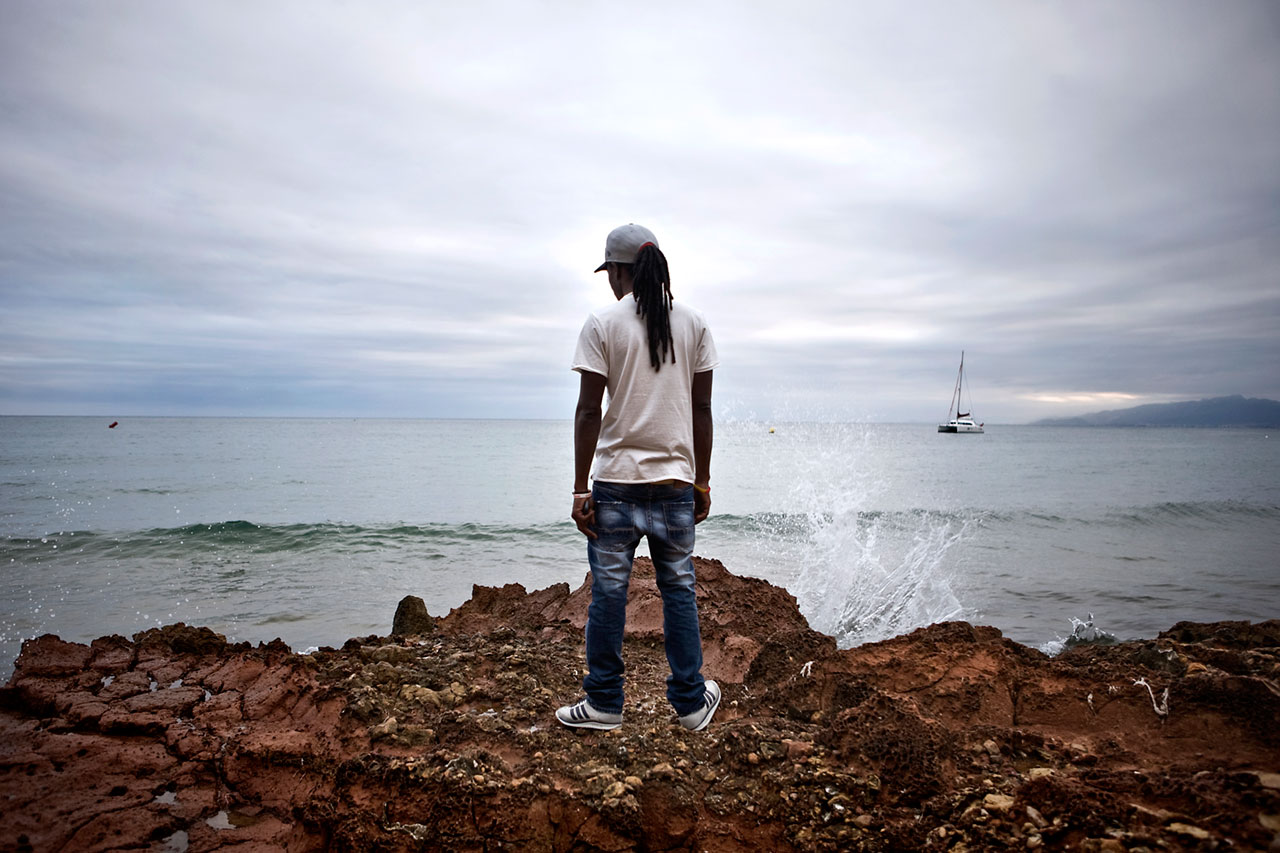
Abdou Sech. Senegal. 53 days in the CIE.
Abdou is not his real name. He chose this name to appear in the report in memory of a friend of his who was deported just over a month ago. He hid his identity because of the expulsion order out for him. His story begins in 2008 at a hospital on the outskirts of Kaolack, Senegal, where his mother was dying. "I am not the oldest, but my mother, when she died in the hospital, her last words were: 'take care of your family.'" Abdou was left without a father or a mother and with six brothers. "Since that day, I have sacrificed my life to come here. I have been at sea for four days in a row, without eating, without drinking...I came with friends from my own neighborhood. They died in front of me in the same boat. You're dying, people watch you. You're dead, you're in the water."
Today, Abdou lives in one of the villages on the Mediterranean coast that tourists invade three months of the year. On March 31, 2017, he was arrested at the train station of El Prat Airport in Barcelona. It was then that he learned he had an expulsion order from the country and he had never been notified of it. It was then that he met the CIE of the Barcelona Free Zone.
"The food is...you know you're not going to eat it, it's that bad. I'd never eat that on the street. And the cops, when they get mad, you have to pay for the broken dishes. I've started a hunger strike inside. When I was inside, there was a countryman of mine [Mamadou Balde], when he was there for five days, we started to get to know each other, talked, we shared tobacco and so on. I saw him worsen every day. He was losing weight, getting thinner every day, coughin and blood was coming out." One night, just before he entered the cells, Mamadou collapsed in front of everyone. Within a few hours, he was hospitalized and diagnosed with tuberculosis. The next day, about half of the people inside the Free Zone CIE were on a hunger strike for medical care. "They're playing with my life. I'm not going to let them. I came in healthy, if I'm expelled, they have to take me back to my country healthy. If they let me go, they have to let me go healthy."
The hunger strikers managed to negotiate directly with the director of the center, who called for a medical examination for the people closest to Mamadou. Abdou was in the top six. All six tested positive for tuberculosis and were given a second test after four days to confirm the diagnosis. Most of the tests could not be performed. Five of the six positives were released, including Abdou. "I've been well. I went to the doctor, but I still have to wait for the prescription here."
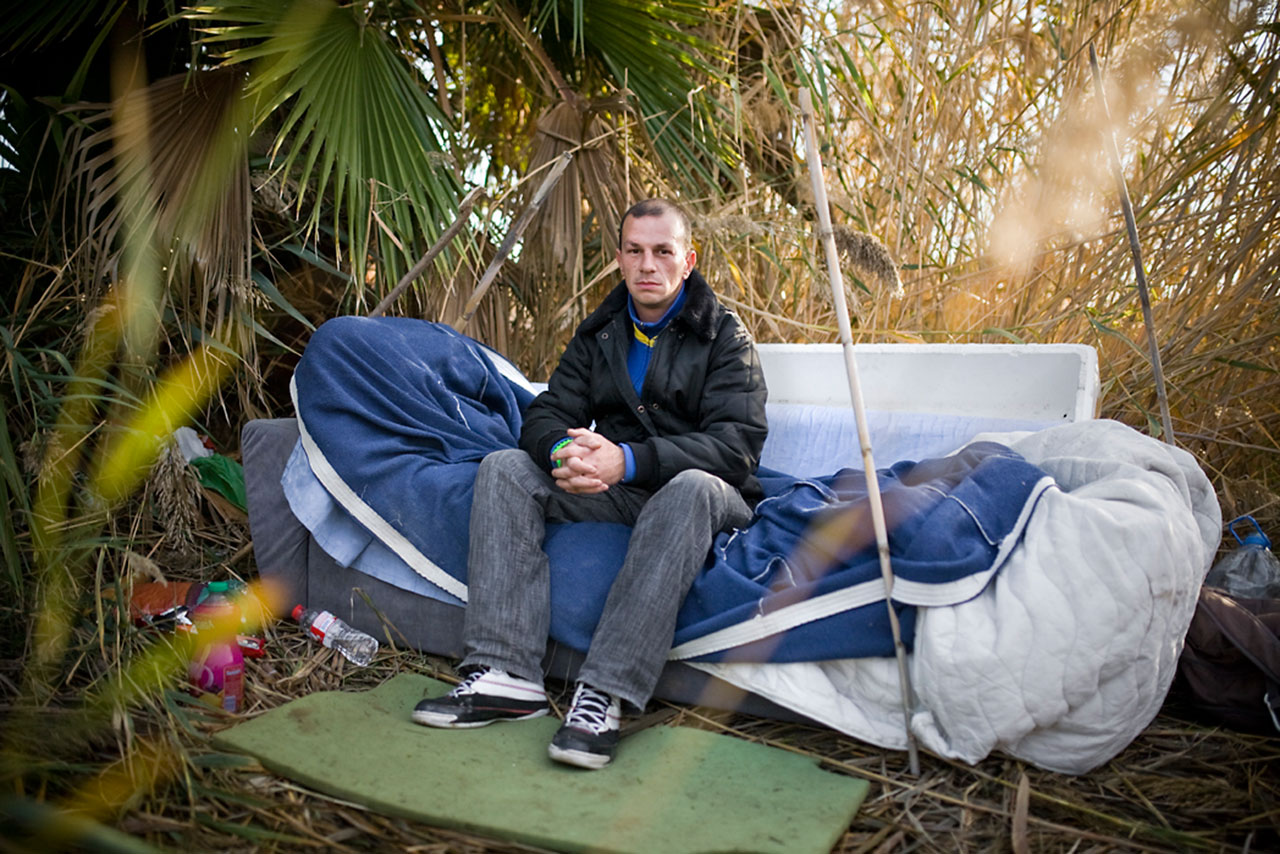
Antonio Oproiu. Romania. 54 days in the CIE.
Antonio moved to Valencia. He liked living in Madrid, but continued arrests forced him to change towns. No job, no house, no family, nothing. His only possession is an abandoned sofa in a field near the City of Arts and Sciences.
"...to find my life. I came alone. I didn't even know the language. Just hello. I spoke a little English, but it too almost a year to learn Spanish. Here, I rooted for Barca, Real Madrid, Kaka, Ronaldiño. In 2007 I came to Madrid. I chose Madrid because of soccer. It was Rome or Madrid." Then the common story that many immigrants in Spain started. He worked in construction until the job offers disappeared.
"I went to jail for six months. I think it was August [2011]. When the prison gave me freedom, two secrets were waiting for me at the door. When I came out, two boys came: 'Hello? You have to come with us.'" From Penal el Dueso in Cantabria to CIE in Aluche, he was expelled. "I spent 40 days in Aluche and I was expelled. I didn't have a problem with people, but with the police. They push you, they hit you...I've heard bad guys in the Madrid Commissioners are sent there as punishment. If you want to report, there's nothing. No lawyer, there's nothing."
"I came back again in August [2014]. Two weeks after I was in Spain, I was stopped by the police on the street: 'Hello, documentation.' They asked me for my passport and they said 'Come with us.'" With his papers confiscated, Antonio was held in the precincts of the police station until he was transferred to the CIE, where he spent two weeks. That time, he was not deported. He was released with notice of expulsion, a threat that soon materialized. In less than 60 days, Antonio was back in a cell. This time, he was sent directly to the airport to execute the expulsion.
"I told you from the beginning that I am from Romania and that I do not want to leave by force anymore. I am European. If I'm bad, put me in jail, it's okay. But with nothing against me, I won't go wherever you want. I don't want to this time." Police responded to Antonio's arguments with punches to the ribs and they put a straitjacket on him in the plane. "I told the pilot I didn't want to go up and that I didn't want to go to Romania, that they're sending me by force." The pilot, the highest authority on any flight, did not accept Antonio as a passenger and the police had to return him to the CIE of Aluche. Then, on the street without documentation again.
"Look, I don't have a hard reality. I want freedom and I love my family. Second day is not like the first. It's very complicated."
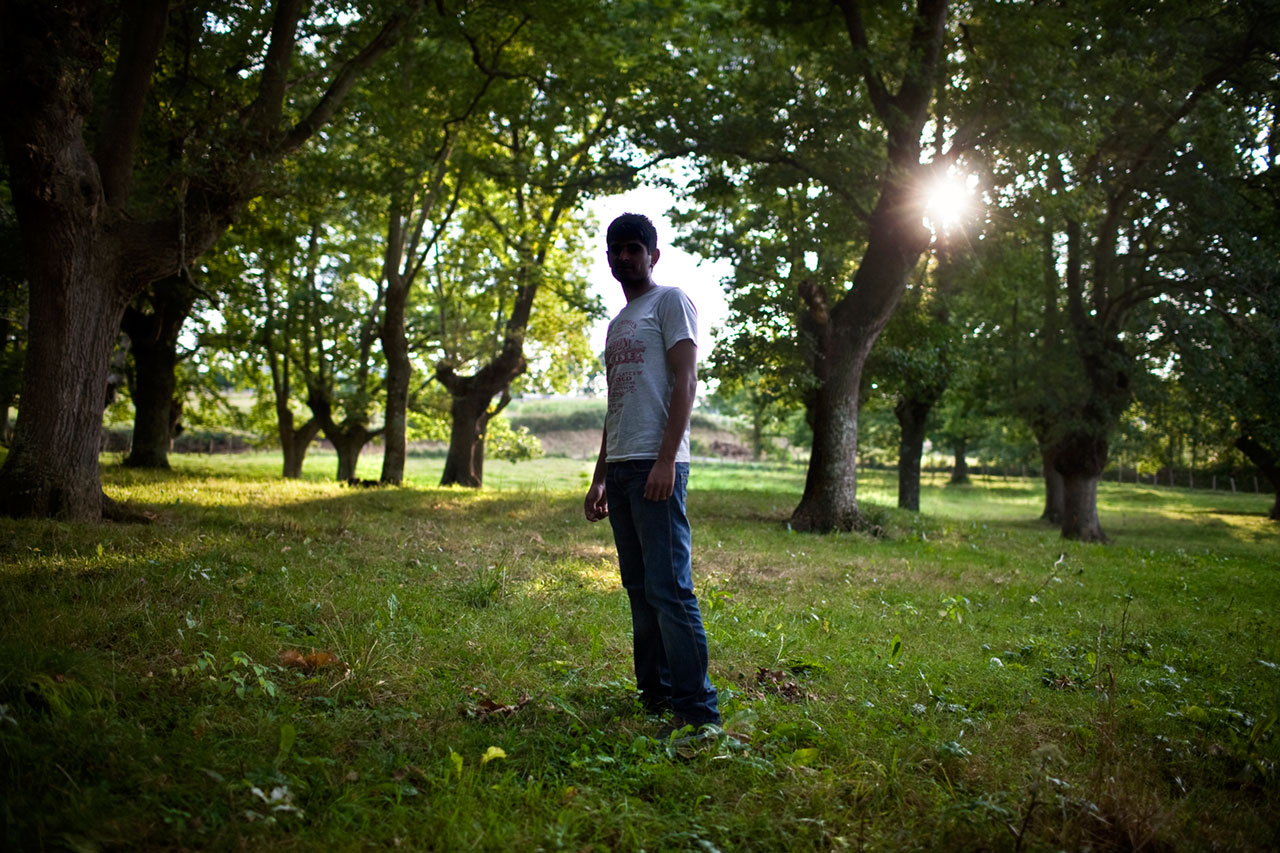
Mohsan. Pakistan. 25 days in the CIE.
Mohsan chose this name because it is the name of his most dear brother, out of six. All of whom live in Pakistan. The first time we spoke, he asked to hide his identity out of fear of being arrested again. It didn't do much good. A few months after the interview, he was deported.
When he was only 21 years old, Mohsan abandoned the poverty in which he had grown up and began a one-year exodus that began in Islamabad and ended in Guipúzcoa. The Basque Country still grants financial aid to people uprooting alone, and that's what made his decision.
In early July 2014, Mohsan had an argument with his partner in a coffee shop. The argument occurred and the police intervened. The young Pakistani was transferred to a nearby commissary station where he spent 24 hours locked up before being released. To his surprise, on the street two national policemen in civilian clothes were waiting for him so they could force him to leave with the Commissioner General of Foreign Affairs in Donostia. There, Mohsan discovered there was an order to send him back to Pakistan.
After the expulsion, Mohsan was tranferred to the CIE of Aluche in Madrid. "Bad, the food wasn't good nor was the sleep. Nothing was good. I'm not to blame. I haven't sold drugs, I've never been arrested, ever, why do you lock me up for a month?...A person, if he's to blame, jail's fine, but I've never been to jail before, I've never been reported before. Even if I'm hungry, I don't steal."
Away from home, Mohsan was unable to receive any visitors in the CIE. His acquaintances in Madrid are also Pakistanis and none of them dared to approach the center out of fear of being arrested. "Not only did I cry, a lot of older people there were crying too. Pakistanis, Moroccans..." On July 28, 2014, he was released again. His freedom only lasted until November 26 at 8 a.m.
The young Pakistani was still sleeping in his home when the National Police came to arrest him. Two days later, he was already on a plane to Islamabad with 70 other Pakistanis and 140 policemen guarding his deportation. That's what Mohsan himself recounts, now on Skype. "Everyone was crying, the whole world was bad." It's hard to imagine the atmosphere of a flight with 70 stories of failure all together.
During the pre-deportation detention, the acquaintances approached the police to ask about Mohsan. An agent replied: 'Very good, one of the best.' He apparently did not take into account that the young man cut both wrists in a last, desperate attempt not to be deported. Now, Mohsan shows long scars by videoconference. Although the harsh memory of deportation is still very much present, he is already thinking about returning to Europe. In Punjab, there is no future for him.
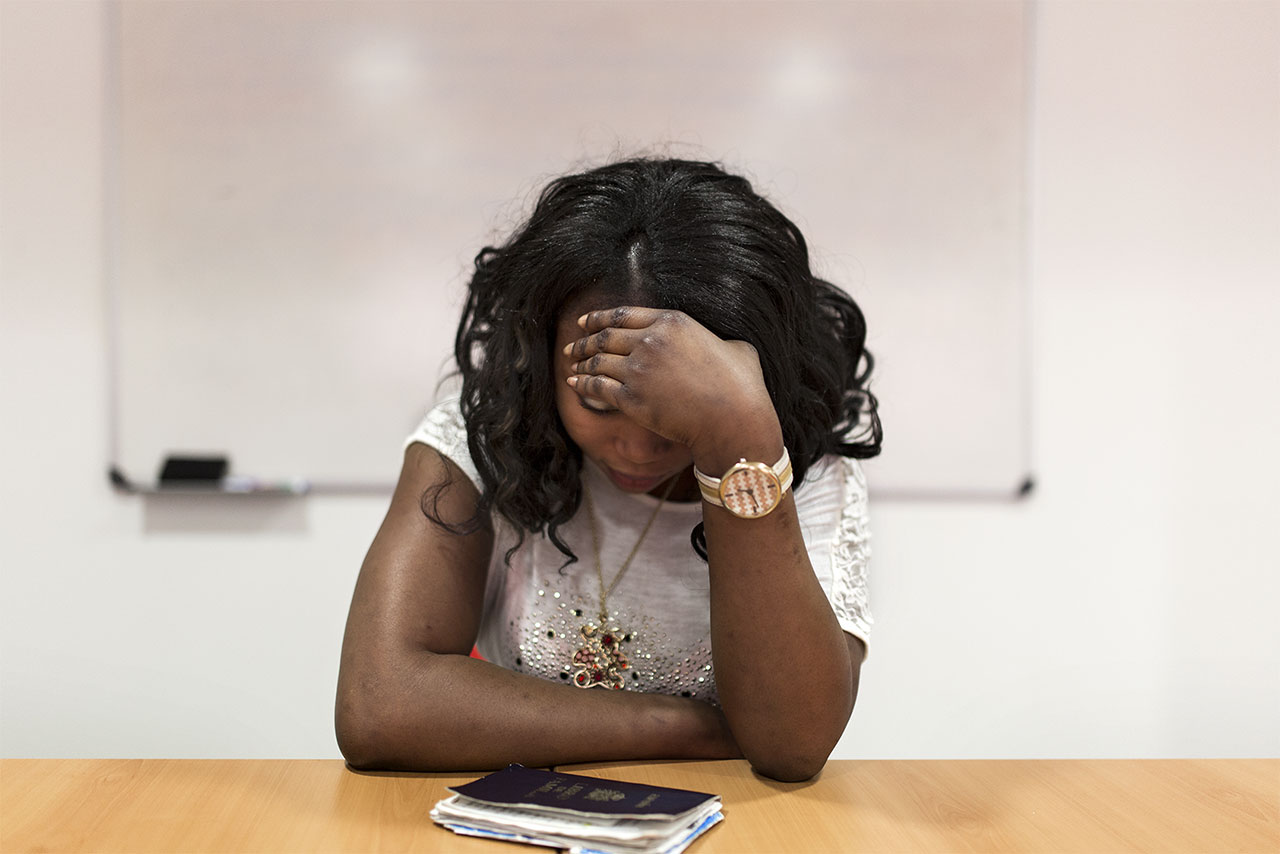
Eva. Nigeria. 7 days in the CIE.
To tell her story, Eva chose her work nickname, the nickname she uses when she prostitutes herself on the street. The 26-year-old Nigerian woman shares her life and story with a 5-year-old daughter.
"We live in the same house, in a room. I don't have a job, I don't have papers. I work on the street. So if I want to go out to work at night, I have to leave my daughter with someone. I pay someone 60 euros because I can't leave her alone. My baby goes to school, I have to pay for books, clothes and I have to pay the house rent with the money I make on the streets. Sometimes I don't have any..."
"I have no family. My father and mother are dead. The suffering was too much, I had to go. [When I left Nigeria], I was two weeks pregnant. First of all, there was a man and I paid him money, after Nigeria to...to Lagos, Lagos to Kano...to several countries. Sometimes we used a big car with a lot of people, sometimes we would walk at midnight in the bushes so the police wouldn't see us. They're trying to kill everybody, they don't want people to cross through their country. We didn't walk in the afternoons, but at midnight, to cross the borders. Sometimes we would stay in the woods for a few days, four or three, and then we walked in the evenings again until we reached Morocco...When I got to Melilla, I gave birth. I was on the street surviving with my baby."
"From Morocco to Melilla in a boat, at night. There were a lot of people, about 160. It was a big boat. We paid people to help us cross, white people there. When we got to Melilla, we were going to be deported, because there are too many Nigerians in Melilla, they said. I changed my name because they were deporting people and I didn't want to go back, so I changed it and said I came from Gambia. My Family Book is from Gambia but my passport is from Nigeria."
Eva settled in Spain and managed to raise her daughter with the limitations of living in an irregular situation. Five years after arriving, in the summer of 2014, she was arrested during a trip to get an employment contract.
"I didn't have papers, I didn't have a passport, I didn't have a photocopy, that's why they caught me. I told them I had a baby but they said: 'No, because the name is different.' The name I have in my family book is from Gambia, but my passport is from Nigeria. That's why they took me to the CIE in Madrid."
Eva was only down there for a week. She didn't talk to anyone, she didn't eat, she didn't sleep. She just cried. The fear of returning to her country and leaving her 5-year-old daughter alone devastated her.
"I didn't want to talk to them. I was very angry because I left my baby. I have to go to my baby! There were no calls, the police had my phone because they said there are no calls in that place. I was so angry, crying so I could leave and go get my baby, that I wouldn't talk to anyone...They let me go, but someone helped me. A lawyer, some people."
Those people who helped Eva were Caritas and Pueblos Unidos, two of the many civil society organizations mobilized to defend the rights of immigrants inside and outside CIEs.
It's hard to understand why, but when Eva was released, her 5-year-old daughter was in a commissary. "My friend said when she took my baby to the police station, she sat down and they took them inside. I was on the bus coming home. I couldn't go ask because I didn't have papers. My friend, the one who took my baby, didn't have papers either." Neither Eva nor the social organizations understood why the baby was held. Finally, mother and daughter reunited ten days later.
"In the future, I would like to have a different job, because this job is very difficult, to walk the streets at night. Sometimes there is no one, only the police pass...
But if I had papers, if I could do another job, I would. I'm trying to get my papers, but without a passport, I can't do anything."

